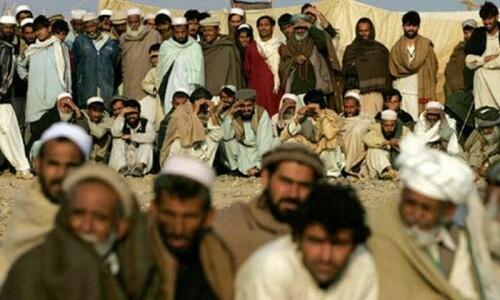AMIDST the din generated by the almost endless series of crises that this country has been facing, the crucial subject of local elections has disappeared from the public discourse. At a time when the centre and provinces are busy passing their respective budgets, we are reminded of the lack of elected representation at the third tier, and the associated difficulties this creates. Surprisingly, it is only Balochistan, considered an ‘unstable’ province, and prone to law and order and administrative problems, which has gone ahead with the process. Khyber Pakhtunkhwa, which also faces terrorism-related problems, has been slow in going ahead with preparations for local polls, although there has been some activity on this front in the province. Delimitation is complete and unless unforeseen obstacles dictate otherwise, polls should be held in a few months’ time. However, Punjab and Sindh, considered Pakistan’s most advanced and stable provinces, are showing no signs that polls will be held anytime soon.
While the Supreme Court has told the provinces to hold local polls by Nov 15 this year, the two provinces are in no mood to carry out the apex court’s order. In both Punjab and Sindh, there has been no move to amend the relevant laws that would allow the Election Commission of Pakistan to go ahead with delimitation, which would pave the way for setting the dates for polls. Whether it is the PML-N in Punjab or the PPP and MQM in Sindh, the political parties running the two provinces do not have polls on their respective agendas. The reason is quite clear: those that rule the provinces fear loss of power should political rivals make headway in the local polls. For parties that swear by democracy and justifiably raise the alarm each time they sense conspiracies are being hatched against the democratic order, their attitude towards local polls flies in the face of any commitment to representative government.
Without an elected third tier, the fruits of devolution will never reach the people. Those who have campaigned for decentralisation and devolution of power in the past must now practise what they preach in the provinces they rule. Indeed, the problems Pakistan currently faces are numerous, with terrorism and political instability topping the list. But the lack of representative government at the local level creates a new set of problems, with people unable to solve local issues. Planning motorways and other grand development projects is one thing; there must also be workable systems in place that allow people to resolve civic issues which affect them the most. Making amendments to the relevant laws and delimitation may be time-consuming exercises, but they cannot be open-ended affairs. Hence the Punjab and Sindh administrations must take practical steps to show the people they intend to hold polls on or before Nov 15.
Published in Dawn, June 29th, 2014













































